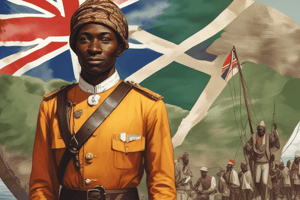Podcast
Questions and Answers
Which of the following is NOT a factor that contributed to the emergence of the Union of South Africa in 1910?
Which of the following is NOT a factor that contributed to the emergence of the Union of South Africa in 1910?
- The desire for a unified state to manage the diamond and gold mines
- The defeat of the Boer Republics in the Anglo-Boer War
- The British policy of granting self-rule to white colonists
- The active involvement of black South Africans in the negotiation process (correct)
The Glen Grey Act of 1894 is significant because it:
The Glen Grey Act of 1894 is significant because it:
- Granted voting rights to black citizens in the Cape Colony.
- Strengthened the authority of traditional chiefs in the Cape Colony.
- Introduced the concept of 'native reserves' and territorial segregation. (correct)
- Promoted equal rights and opportunities for all South Africans.
Which of the following best describes the nature of pre-colonial governance structures in South Africa?
Which of the following best describes the nature of pre-colonial governance structures in South Africa?
- Diverse and decentralized, often centered around the concept of chiefdoms. (correct)
- Highly centralized and based on a written constitution.
- Based on a strict separation of powers between the legislature, executive, and judiciary.
- Focused on individual rights and freedoms rather than collective responsibility.
The British government had no role in the formation of the Union of South Africa.
The British government had no role in the formation of the Union of South Africa.
The South African Constitution of 1996 fully abolished all forms of traditional governance structures.
The South African Constitution of 1996 fully abolished all forms of traditional governance structures.
The Union Constitution granted voting rights to all men in South Africa.
The Union Constitution granted voting rights to all men in South Africa.
The Orange Free State Constitution of 1854 included a justiciable Bill of Rights.
The Orange Free State Constitution of 1854 included a justiciable Bill of Rights.
The 'peaceful annexation' of land by the colonial powers was a justifiable and accurate historical account.
The 'peaceful annexation' of land by the colonial powers was a justifiable and accurate historical account.
The historical context of South Africa has no bearing on the interpretation of the Constitution.
The historical context of South Africa has no bearing on the interpretation of the Constitution.
The South African Constitution is a living document that is subject to interpretation and reinterpretation.
The South African Constitution is a living document that is subject to interpretation and reinterpretation.
What was the significance of the Anglo-Boer War in the development of South Africa's constitutional history?
What was the significance of the Anglo-Boer War in the development of South Africa's constitutional history?
Explain the concept of a 'bifurcated state' as it applied to South Africa during the pre-apartheid period.
Explain the concept of a 'bifurcated state' as it applied to South Africa during the pre-apartheid period.
What were the key features of the governance structures of the Zulu Kingdom under King Shaka?
What were the key features of the governance structures of the Zulu Kingdom under King Shaka?
Describe the role of the 'Governor-General' in the colonial governance structures of the Cape and Natal colonies.
Describe the role of the 'Governor-General' in the colonial governance structures of the Cape and Natal colonies.
Why is it important to consider the social, economic, and political realities of South Africa when interpreting the Constitution?
Why is it important to consider the social, economic, and political realities of South Africa when interpreting the Constitution?
What is the 'transformative nature' of the South African Constitution?
What is the 'transformative nature' of the South African Constitution?
Explain the concept of 'legal pluralism' in the context of South Africa's legal and social history.
Explain the concept of 'legal pluralism' in the context of South Africa's legal and social history.
What is the significance of the Constitutional Court's decision in S v Zuma and Others (1995)?
What is the significance of the Constitutional Court's decision in S v Zuma and Others (1995)?
The ______, a system of racial segregation and discrimination, was a consequence of the ______ created during the pre-Union period.
The ______, a system of racial segregation and discrimination, was a consequence of the ______ created during the pre-Union period.
The ______, adopted by the British colonies in South Africa, gave the ______ significant power over legislation.
The ______, adopted by the British colonies in South Africa, gave the ______ significant power over legislation.
The United States constitutional model strictly separates the branches of government.
The United States constitutional model strictly separates the branches of government.
One feature of the Westminster model is that it uses an unwritten constitution.
One feature of the Westminster model is that it uses an unwritten constitution.
Constitutionalism prescribes limits on the exercise of state power by various branches of government.
Constitutionalism prescribes limits on the exercise of state power by various branches of government.
The Westminster model emphasizes a strict separation of powers among government branches.
The Westminster model emphasizes a strict separation of powers among government branches.
The US constitutional model does not allow for judicial review.
The US constitutional model does not allow for judicial review.
One of the roles of constitutionalism is to describe the nature of relations between state institutions and the people they govern.
One of the roles of constitutionalism is to describe the nature of relations between state institutions and the people they govern.
In the Westminster model, members of the judiciary also serve in Parliament.
In the Westminster model, members of the judiciary also serve in Parliament.
South African constitutionalism merely formalizes a stable and unbroken historical consensus of values.
South African constitutionalism merely formalizes a stable and unbroken historical consensus of values.
The rule of law is identical to the Rechtsstaat principle.
The rule of law is identical to the Rechtsstaat principle.
Dicey identified three main principles constituting the rule of law.
Dicey identified three main principles constituting the rule of law.
During apartheid, the government fully respected the rule of law in its substantive form.
During apartheid, the government fully respected the rule of law in its substantive form.
The Law of Lagos views the rule of law as a static concept.
The Law of Lagos views the rule of law as a static concept.
Under the 1996 Constitution, the rule of law is considered a founding value alongside constitutional supremacy.
Under the 1996 Constitution, the rule of law is considered a founding value alongside constitutional supremacy.
Direct democracy is the primary system of governance in modern nation-states.
Direct democracy is the primary system of governance in modern nation-states.
Constitutional democracy is one of the conceptions of democracy highlighted in the South African Constitution.
Constitutional democracy is one of the conceptions of democracy highlighted in the South African Constitution.
Which of the following contributed to the formation of the Union of South Africa?
Which of the following contributed to the formation of the Union of South Africa?
Flashcards are hidden until you start studying
Study Notes
Formation of the Union of South Africa
- The Union of South Africa was formed in 1910 following the defeat of the Boer Republics (Orange Free State and Transvaal) by the British in the Anglo-Boer War (1899-1902).
- The process was about granting self-rule to white colonists, who were mainly of British and Afrikaner descent.
- The British allowed the creation of the Union with the purpose of protecting its interests in the area, particularly its control over the diamond and gold mines.
- The Union Constitution did not grant the right to vote to Black South Africans, further entrenching the racial segregation that characterized the country's history.
Pre-Colonial Governance Structures
- Pre-colonial South Africa was characterized by decentralized governance structures.
- These structures often centered around the concept of chiefdoms, where local leaders, often called kings or chiefs, ruled over their respective communities.
- This differed significantly from the highly centralized governance and written constitutions characteristic of many European nations at the time.
Post-Colonial Governance Structures
- The British colonial government implemented the “Westminster system” in the Cape Colony and Natalia, which gave considerable power to the Governor-General appointed by the Crown.
- This system relied on a separation of powers between the legislative, executive, and judicial branches but was used to disadvantage Black South Africans and enshrine colonial control.
The Glen Grey Act and the Rise of Segregation
- The Glen Grey Act of 1894 marked a significant shift in South African governance.
- It introduced the concept of "native reserves" and "territorial segregation," further restricting the rights of Black South Africans and legitimizing their displacement to increasingly marginalized regions.
- This system built the foundation for the apartheid system that came to define South Africa's 20th century politics.
The Concept of "Bifurcated State"
- The "bifurcated state" refers to the segregated legal and political systems applied to white settlers and Black Africans in South Africa.
- This separation of legal systems was the foundation of ongoing racial discrimination and institutionalized inequality in South Africa.
- The concept highlights the unequal power dynamics and the systematic marginalization of Black South Africans during this period.
The 1996 Constitution
- The South African Constitution of 1996, known for its commitment to justice and equality, is considered transformative.
- The Constitution seeks to address past injustices and establish a new society based on equal rights and opportunity for all citizens.
- The Constitution does not fully abolish existing traditional governance structures but recognizes their role alongside other legal systems within the country.
- This is an example of "legal pluralism," where different legal systems (common law, customary law, religious law) coexist.
The Significance of the Constitutional Court's Decision in S v Zuma and Others (1995)
- This case established the Constitutional Court's authority as the highest court in South Africa, empowering it to interpret and enforce the Constitution's provisions.
- The court's decision exemplified its commitment to applying the Constitution to address the legacy of apartheid, highlighting the transformative nature of South Africa's legal evolution.
### US Constitutional Model
- The US Constitution strictly separates the branches of government.
- Judicial review is allowed under the US constitutional model.
Westminster Model
- The Westminster model uses an unwritten constitution.
- The Westminster model does not emphasize a strict separation of powers between government branches.
Constitutionalism
- Constitutionalism prescribes limits on the exercise of state power by various branches.
- Constitutionalism describes the nature of relations between state institutions and the people.
South African Constitutionalism
- South African constitutionalism does not merely formalize historical values.
Rule of Law
- Rule of law is not identical to the Rechtsstaat principle.
- Dicey identified three main principles of the rule of law.
- The Law of Lagos views the rule of law as a dynamic concept.
- Rule of law is considered a founding value alongside constitutional supremacy in the 1996 South African Constitution.
- The government did not fully respect the rule of law in its substantive form during apartheid.
Democracy
- Direct democracy is not the primary system of governance in modern states.
- Constitutional democracy is one of the conceptions of democracy highlighted in the South African Constitution.
Studying That Suits You
Use AI to generate personalized quizzes and flashcards to suit your learning preferences.




